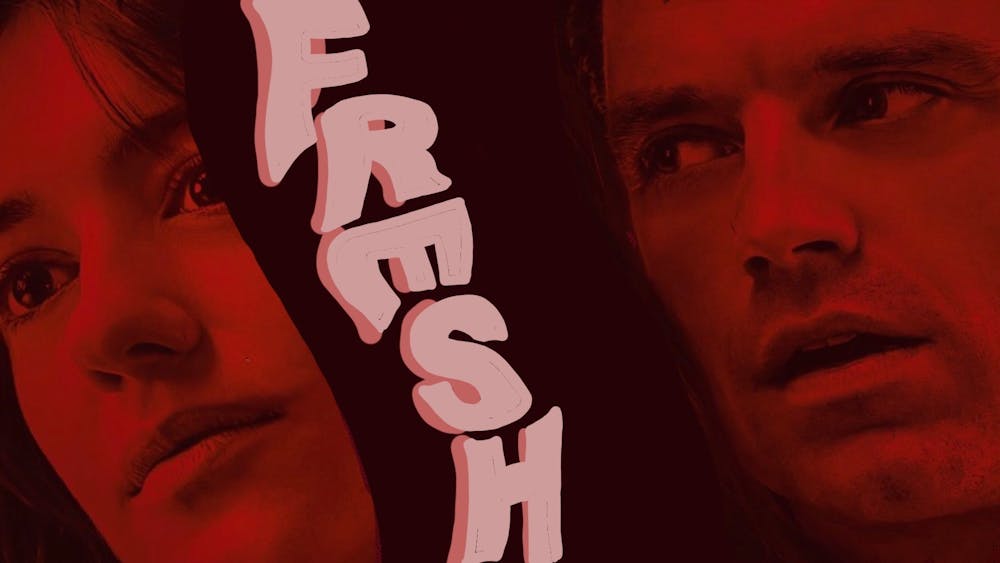Dating online has a bad reputation already—the horror stories are endless and only seem to get worse with time. Television and media have illustrated distinctly the potential dangers of meeting a stranger online and getting a meal or a cup of coffee together. Hulu’s newly buzzed–about movie Fresh shows exactly that, in the initial scenes where Daisy Edgar–Jones’ Noa sits down for yet another failed date with yet another misogynistic douchebag. Maybe this feels familiar to you, maybe not, but this scene encapsulates the awkwardness and frankly, contemporary patheticness that revolves around first dates that are definitely not going anywhere.
While the movie starts off highlighting the grossness of Tinder–like apps where men have the audacity to flaunt their genitals in your messages, we then experience a classic rom–com meet–cute at the grocery store. The scene exemplifies what Cody Ko’s "THAT'S CRINGE: you." video could have been in another dimension (celery and rosé ring a bell?). Who flirts over grapes and broccoli at the local Whole Foods? Apparently, Steve—played by Sebastian Stan—does, and he’s great at it, eventually acquiring Noa’s number before the two part ways.
A commonality in dating stories gone awry is the presence of an uber–charismatic man. No need to get into the gory details, but remember Ted Bundy's shtick for using his attractiveness to lure in women? How that charisma translated all the way to court, where multiple women nationally claimed that a man as charming as Bundy could never have performed such grotesque acts? Stan’s performance knocks this pattern out of the park.
His role as Steve shows the perfect man: a plastic surgeon, who's simultaneously sexy and mysterious, off social media, and vegetarian, who successfully manages to ease the inner dating skeptic within Noa. The shift in the dynamics between Noa and Steve, as well as in her perspective on dating, satiates the prior emptiness she thought she was forced to feel by finding happiness through someone else. And it's on that vulnerability that Steve decides to pounce.
His swooning persona persuades Noa to go away for the weekend to Cottage Grove, where she decides to indulge in a cocktail he mixed for her, and surprise, surprise, she wakes up chained to the wall.
It's then where things take a turn and Steve reveals his true hand—he's a cannibal who harvests his victims' meat and sells it to his filthy rich clients. He targets women who don't have much family, but doesn't kill them right away. This is where the film's title really comes to light, as Steve reveals his process of keeping the women alive for as long as possible, and gradually taking away piece by piece, to keep their meat fresh. The movie has multiple twists and turns, and you will be guaranteed to audibly gasp out loud at certain points.
Something to appreciate in Fresh is its cinematography and how it picks up the little details that you would've thought to miss at first. The amateur–like close–up shots with variations in warm and cool tones not only reflect Steve’s rosy red lips (how intentional) and creepy, subtle smirk, but also the isolation of his relationship with Noa. The consistent unsettling background music certainly helps, too.
Perhaps one of the smartest decisions made in the production of this film is withholding the introduction and title credits until the 33–minute mark, when the audience truly gets a glimpse of Steve’s real identity, and his nonchalance in being a “casual” cannibal who drugs and sells women’s body parts to an underground market. Don’t forget that he enjoys indulging in his own “work,” too.
While the outright cannibalism is really what draws in so much audience engagement, the parallelism in this movie is something to truly applaud. Director Mimi Cave drops subtle clues throughout the film, interconnecting the characters in such a way that makes Fresh a social commentary, culminating in the final scene.
In the beginning of the film, Noa's first (and last) date with Chad shows how he felt that today's women should stay in dresses rather than frumpy, oversized sweaters. This ideology isn't unheard of, regardless of how backwards it is, and though we've all faced many Chads in our lifetimes, it's how Steve reflects this misogynistic idea in more subtle ways that's so striking.
In the last dinner Steve and Noa have, he dresses her up in an ultra–feminine doll–like outfit while she plasters on a fake smile to appease—and eventually trick—him. Noa's pink dress is the full–circle moment from her date with Chad once we realize how Steve only really likes Noa when she perfectly embodies the submissive, the feminine. It also explains why he only eats and sells women—newsflash, they don't really taste any better. The consistent theme of expecting perfection from women in society today is what drives the plot forward, even though it may be overshadowed by the blatant trauma of casual cannibalism.
Fresh has a lot of nuance and symbolism to it that one could definitely go back to pick apart. The jarring parallels speak to society, complemented by the cast's disturbing performances and Cave's careful direction. It's both stomach–churning and decadently repulsive while sinking into the commodification of the female body today. While looking into the consumption of hookup culture paired with the bluntness of another sort of consumption, Fresh serves up the story of a scarcely explored topic we really don't think about in cinema, while subtly delving into the evolution and backwardness of gender roles.

